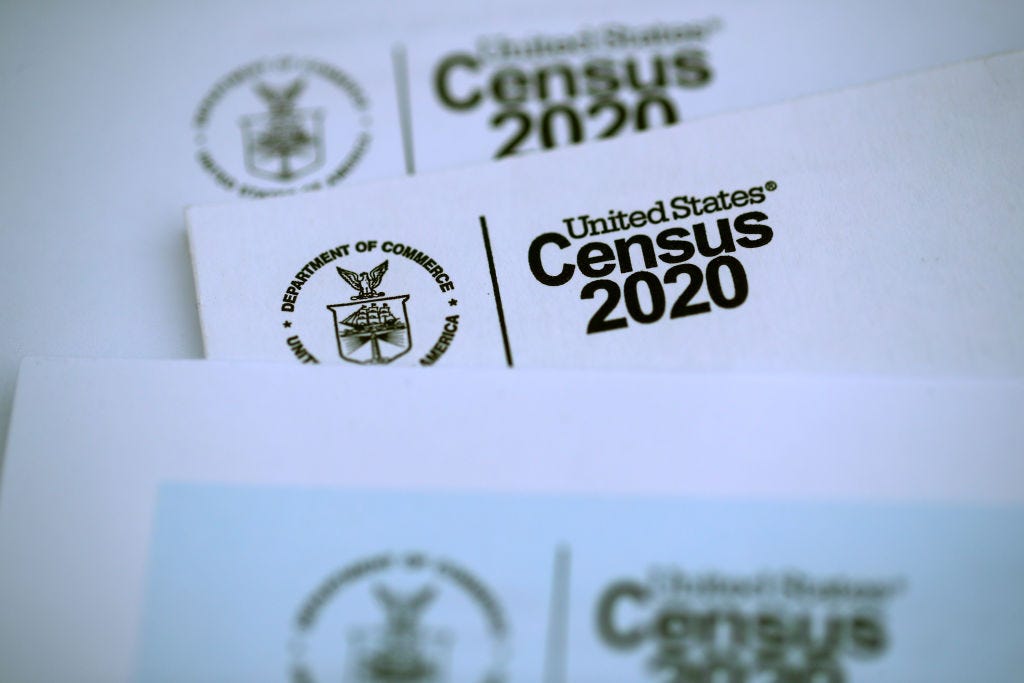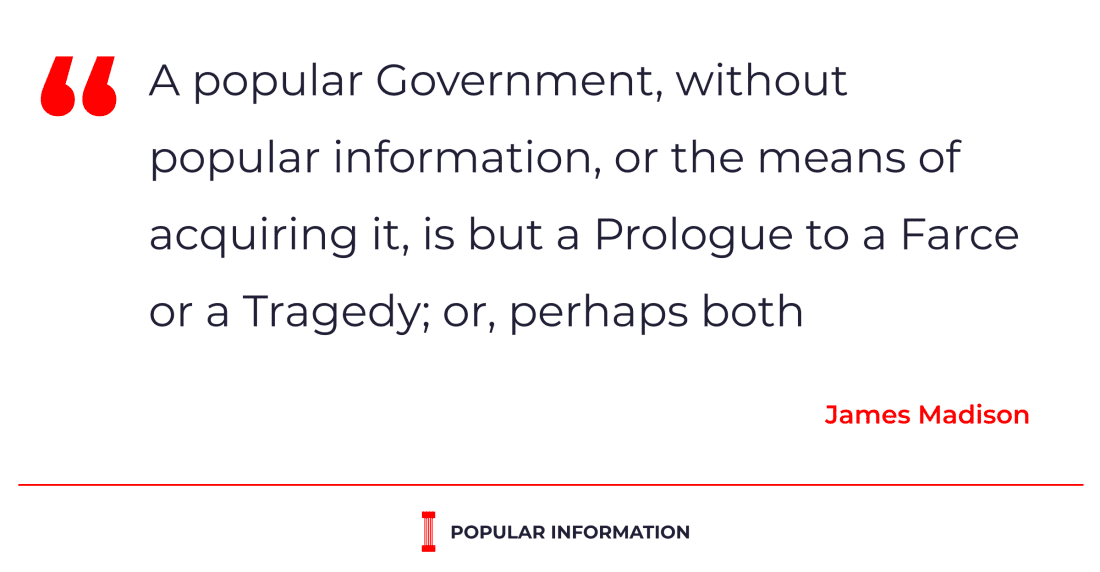Stealing the census

Photo Illustration by Justin Sullivan/Getty Images
Long after Trump leaves office — whether that is in a few months or a few years — the 2020 Census will have a profound impact on the nation. For the next decade, the Census will determine the distribution of trillions in federal funds and be used to distribute political power at the state and national levels.
The pandemic has further complicated what is always a massive undertaking. According to the latest data, about 40% of households have yet to be counted. The most difficult part of the process, counting households who do not self-report, has yet to even begin. But this week, the Census Bureau abruptly announced it would end the count a full month early:
We will end field data collection by September 30, 2020. Self-response options will also close on that date to permit the commencement of data processing. Under this plan, the Census Bureau intends to meet a similar level of household responses as collected in prior censuses, including outreach to hard-to-count communities.
The Census Bureau did not explain why it intended to stop all counting 30 days early. But the decision was inexplicable because even when the plan was to count until the end of October, senior Census officials said they needed more time.
Under current law, the Census Bureau is required to deliver the results to the president on December 31. "We have passed the point where we could even meet the current legislative requirement by December 31. We can't do that anymore," Tim Olson, who is leading field operations for the 2020 Census, said in May.
The Census Bureau requested that the deadline for the data be extended until next April. That request, until this week, was supported by the White House. This Spring, Trump personally supported giving the Census Bureau more time. "During this difficult time we're also working to ensure that the 2020 Census is completed safely and accurately," Trump said. "So the Census, we are going to be asking for a delay, a major delay."
But now the Census Bureau says they are ready to finish early.
On July 29, former Census Bureau Director John Thompson told Congress about the impact of failing to extend the deadline:
The career people who are experts at taking the census requested a four month extension of the deadlines that’s in their Title. They know what they are doing. They know what it’s going to take to get the census done. Not extending those deadlines is going to put tremendous pressure on the Census Bureau. It’s not clear what kind of quality counts they can produce if they don’t get the extension. So it could be a really big problem.
So why has the Trump administration changed its plans?
The sudden switch may be related to Trump's June executive order to apportion congressional seats based only on the number of citizens and other legal residents. This will be put into practice when Trump communicates the data to Congress after receiving the results of the of 2020 Census.
Excluding undocumented immigrants from the numbers used to apportion Congressional seats is a brazen power grab that may be struck down by the courts. But, as long as Trump is still president, he has a chance to pull it off.
While Trump will almost certainly be president in December 2020, things are much more up in the air for April 2021. So the Census Bureau seems to be cutting short the vote to match Trump's political timetable.
"This is a whole systemic attack on the census for political gain. There’s an intentional attempt here to basically steal the census — to politicize this census to gain Republican seats across the country," Julie Menin, the census director for New York City, said.
What happens when you end the count early
Even if Trump's plan to exclude undocumented immigrants fails, ending the count prematurely could significantly distort the data. The 40% of households that haven't been counted yet are the hardest to reach and are mostly "people of color, immigrants, renters, rural residents and other members of historically undercounted groups."
In 2010, the Census Bureau's field program lasted from May to August. This year, due to the pandemic, the program was shifted from August to the end of October. The Trump administration just chopped another month off of an already compressed timeline. And, due to the pandemic, executing a field program is significantly more difficult this year than in previous years.
The result will likely be a significant undercount of marginalized groups. In the past, the Census Bureau has used a process called "imputation" to correct for undercounts. But in 2010, that process was used to add .39% to the total count. This year, if the Trump administration does end the count in September, it could require the Census Bureau to estimate "10 or 15 percent" of the count. It's unclear if the Trump administration would allow this. But even if it did, this would not fully solve the problem. Imputation works by estimating the number of people you miss based on the people you count. But if you miss certain marginalized groups in the initial count, those same groups may be underrepresented in the imputed count.
Legislation stalled in Congress
Still, Congress has the power to extend the deadline. After the Census Bureau asked Congress for “statutory relief” to extend the window of data collection activities back in April, House Democrats included a provision for pushing back the Census deadline by four months in their coronavirus relief bill. Democrats also released a bill later in May titled the “Fair and Accurate Census Act” that would grant the Census Bureau the four-month extension.
Senate Republicans, however, did not include the extension in their latest coronavirus relief package. Instead, they’re including $448 million for Census field activities, without extending the deadline.
Yesterday, Representative Carolyn Maloney (D-NY), chair of the House Committee on Oversight and Reform, issued a letter to Census Bureau Director Steven Dullingham denouncing the Bureau’s plans. “This move will rush the enumeration process, result in inadequate follow-up, and undercount immigrant communities and communities of color who are historically undercounted,” Maloney writes. In the letter, Maloney also requested that eight Census officials (two of whom were recently appointed by Trump in June) appear before the committee.
Other officials are also voicing their disapproval. Most recently, four former U.S. Census Bureau Directors published a statement, writing that their “expert opinion is that failing to extend the deadlines to April 30, 2021 will result in seriously incomplete enumerations in many areas across our country.” New Hampshire Senator Jeanne Shaheen (D-NH) also wrote a letter to Dullingham yesterday regarding the “political meddling” in the Census. In the letter, Shaheen states that rushing the Census was “unacceptable,” reminds Dullingham of the four-month delay he requested, and asks Dullingham to explain what has changed in the Census’s operational plans that makes the extension unnecessary.
Thanks for reading!



Quick question from my friends in the Caribbean. Is America now the shithole country that Trump talked about in 2016?
Look, he's already gamed the system by installing an incompetent political hack as the Postmaster General, so why wouldn't he do this, too? There is no depth to which he and the Republican leadership will not sink, and to repeat a point I have frequently made, his supporters are perfectly fine with that.